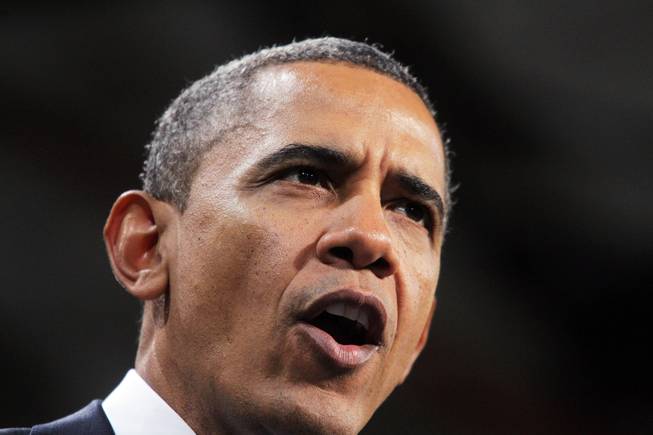
President Barack Obama speaks about immigration reform at Del Sol High School in Las Vegas on Tuesday, January 29, 2013.
Tuesday, Feb. 12, 2013 | 2 a.m.
For a preview of President Barack Obama’s State of the Union speech, look no further than his recent inaugural address.
“The president has always viewed these two speeches as two acts in the same play,” a White House official said, previewing the president’s annual address to Congress on Monday.
In his inaugural address three weeks ago, Obama spoke about investing in infrastructure and education, promoting sustainable energy solutions and climate change, and fulfilling a promise on immigration.
He will return to the same themes tonight. But where the inaugural address was an overview, designed to weave Obama’s second term priorities into the tapestry of American history, the State of the Union address tonight is a time to get down to specifics.
The White House official said Obama will speak about infrastructure, energy, education and manufacturing investments as tools to attain three main goals: to make the United States “a magnet for job creation”; to give every citizen “the skills they need to do those jobs”; and to ensure that “hard work leads to a decent living.”
The speech, the official indicated, will stick to two main themes: jobs and economy, and areas where Obama and Congress can conceivably work together.
“We don’t view this as an opportunity for the president to either bend to the will of Congress or throw down the gauntlet,” the official said.
“The president believes that a good debate is good for our economy ... but it can’t be endless,” he said. “So the president will challenge Congress to seize common ground where it exists.”
The official pointed out that certain events in recent months had brought lawmakers and the president closer together on what have been intensely polarizing issues. The tragic elementary school shooting in Newtown, Conn., “has changed the debate” on gun control, the official said. Meanwhile, a decisive Hispanic turnout for Democrats in the 2012 election has brought several Republicans eagerly to the table to work out a compromise on immigration reform.
But in areas such as energy policy, that common ground may not be so easily attainable.
Republicans and Democrats remain bitterly divided over permitting, which has reared its head in the lengthy debate over the Keystone XL oil pipeline, and the competition over tax subsidies and investments for renewable versus carbon-based fuels.
The official listed solar panels, retrofitting buildings and construction of windmills as areas where “important investment ... can lead directly to very good-paying middle-class jobs in this country.”
But with House Republicans pursuing an energy strategy that pegs the future of job growth to the success of the carbon fuel market against which renewables compete, the prospects for common ground are more sparse.
“[The president] can talk about the need for more renewables ... but I don’t know outside of exhortations that he has a lot that he can actually do,” said Charles Ebinger, director of the Energy Security Initiative at the Brookings Institution.
Obama will not be able to devote the entire State of the Union speech to detailing his vision and gaming its viability for the next four years. He also will devote time to pressing matters at hand, the White House official said.
Lawmakers will be listening chiefly to what direction he gives on the budget and taxation. In less than three weeks, across-the-board federal spending cuts known as sequestration are due to kick in. Since the inauguration, Democrats and Republicans have been divided over whether and how to circumvent them, with Democratic leaders arguing for a series of short-term steps and Republican leaders preferring to let the sequestration cuts take their full effect rather than offset them through a piecemeal approach.
“This is the kind of deal that nobody’s going to love,” the White House official admitted, suggesting the president would request one more delay of the sequester in order to strike a meaningful balance with the Republican Party. “What we can do is give Congress the time it needs ... and hopefully end up in a place where we have a large, balanced deal along the lines of what the president himself laid out.”

Join the Discussion:
Check this out for a full explanation of our conversion to the LiveFyre commenting system and instructions on how to sign up for an account.
Full comments policy